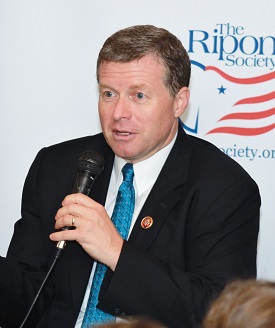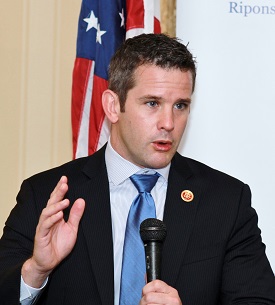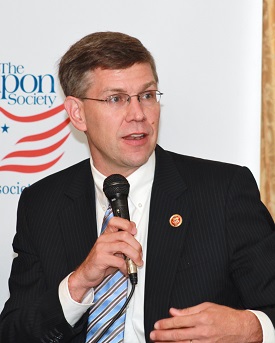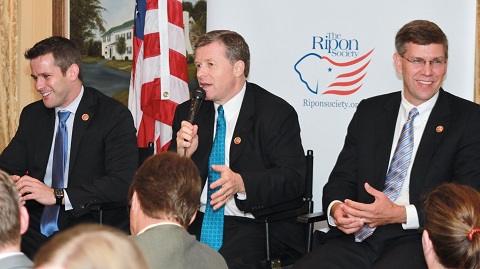Dent, Kinzinger and Paulsen talk about the resurgence of the House Tuesday Group and the group’s mission moving forward this year
 WASHINGTON, D.C. – The leaders of the Tuesday Group appeared before a breakfast meeting of The Ripon Society this past Friday to discuss the group’s agenda in the 113th Congress and its mission moving forward this year. The leaders included Reps. Erik Paulsen (MN-3), Adam Kinzinger (IL-16), and Charlie Dent (PA-15), who serves as Co-Chairman of the center-right caucus of House Republicans and who opened his remarks by talking about the group’s resurgence as “the governance wing” of the GOP.
WASHINGTON, D.C. – The leaders of the Tuesday Group appeared before a breakfast meeting of The Ripon Society this past Friday to discuss the group’s agenda in the 113th Congress and its mission moving forward this year. The leaders included Reps. Erik Paulsen (MN-3), Adam Kinzinger (IL-16), and Charlie Dent (PA-15), who serves as Co-Chairman of the center-right caucus of House Republicans and who opened his remarks by talking about the group’s resurgence as “the governance wing” of the GOP.
“There are articles written about the Tuesday Group’s demise,” Dent stated. “But that simply isn’t true. Our group has nearly 50 members. We have a number of Members who are very active, and I think we have one thing in common — we consider ourselves the governance wing of the Republican Party. We’re the folks who understand that, as Members of Congress, we have a firm obligation to govern — to get things done. Our job would be really easy if we just had to push the ‘no’ button every day. At some point, people have to lead. They have to stand up. And that’s what our members tend to do with many of the big issues that our country faces.
“The bottom line is that our members are trying to get things done. They put forward solutions to real problems that people face. I’d argue that our members are more focused on economic issues and tend to stay off of the hot-button cultural and social issues. Generally, they very much want to be engaged on the issues of the economy, job-creation, and energy production. That is what our group is all about.”
Kinzinger agreed.
“We’re a group where a lot of us are conservative and there are some who would call themselves moderate,” he stated. “But the point is, we’re a group of folks who believe that when you control one-third of the government, your job is to govern. When you’re in the minority, it’s easy to go home and say, ‘I voted ‘no’ on every bad piece of legislation,’ because literally all that you have to do in the minority is vote ‘no.’ That’s your job.
“But once you take that position of being in the majority, you have a level of responsibility that comes with it. It’s especially difficult in a government when you have a Democratic-controlled Senate and a Democratic President. We now find ourselves in a position where we have two choices. We can either burn the place down – and we have the ability to do that. We don’t have to accept anything. We don’t have to do anything. We can burn the place down and say, ‘Hey, we at least stuck 100 percent to what we believe.’ Or we can actually try and find that area where we can maybe find some common ground and move this country forward in the right direction.”
 “I can tell you a hundred things in the Fiscal Cliff I didn’t like. But I also saw in the Fiscal Cliff deal that Republicans were able to influence that piece of legislation – outpunching our weight class. What you saw that came out of that was far more than one-third Republican influence. You had Bush tax cuts made permanent under $400,000. That had never been done — even when we had all three branches of government. We also took care of the AMT problem. I’ve got a bunch of farmers in my district who are happy that they don’t have to talk about an estate tax again for a while. So that’s what we’re here to do — to say we want to be a part of the conversation and move this country forward. Because at the end of the day – and I’m not trying to sound overly patriotic – but at the end of my time in Congress, however long that is, I have to look at myself in the mirror and ask, ‘What did I do during my time here?’”
“I can tell you a hundred things in the Fiscal Cliff I didn’t like. But I also saw in the Fiscal Cliff deal that Republicans were able to influence that piece of legislation – outpunching our weight class. What you saw that came out of that was far more than one-third Republican influence. You had Bush tax cuts made permanent under $400,000. That had never been done — even when we had all three branches of government. We also took care of the AMT problem. I’ve got a bunch of farmers in my district who are happy that they don’t have to talk about an estate tax again for a while. So that’s what we’re here to do — to say we want to be a part of the conversation and move this country forward. Because at the end of the day – and I’m not trying to sound overly patriotic – but at the end of my time in Congress, however long that is, I have to look at myself in the mirror and ask, ‘What did I do during my time here?’”
Paulsen echoed his colleague’s assessment.
“I think the parameters and initiatives of the Tuesday Group parallel what the Ripon Society stands for. And I think it comes out of what the Reagan governing majority would want to do. I really think that’s what the makeup of the Tuesday Group is. We have a pretty good selection of what I would argue are conservative to moderate members in our group. We meet once a week and we have lunch. We thoughtfully and methodically go over every bill coming up on the floor: ‘Are there additional amendments we want to propose?’ ‘What makes sense moving forward?’
“I do remember a couple of years ago, when I first got here and I decided to join the group and follow in the footsteps of Bill Frenzel and Jim Ramstad, I noticed that now-Senator Mark Kirk was presenting a Suburban Agenda for the first time. And that kind of got me excited to talk about getting something done — connecting with the electorate and being positive and for something.”
Paulsen is serving his third term in the House and is a member of the Ways & Means Committee, while Kinzinger is in his second term and is a member of the Committee on Energy and Commerce. The pair serve as Co-Chairmen of the Tuesday Group along with Dent, who is a Member of the Appropriations Committee and was elected to Congress in 2004.
 Following their opening remarks, the troika took questions on a number of issues, including the recent Farm Bill that went down to a surprising defeat.
Following their opening remarks, the troika took questions on a number of issues, including the recent Farm Bill that went down to a surprising defeat.
“I think that is a classic example of the problem our conference confronts,” Dent said of the failed legislation. “I did not like the 2008 farm law. I voted against it. The bill on floor the other day was, I feel, better than the current law. I think that sometimes some of our members have trouble recognizing that incremental progress is good. You don’t get everything. And I guess what is frustrating to me is that some folks were offering amendments ostensibly to improve the bill. When the amendment gets adopted, then they vote against the final bill.
“At the end of the day, the bill was better than the current law. I think that some of our members are under pressure from outside groups and other folks and they decide to vote ‘no.’ At some point, we can all run around and point fingers on why it failed. ‘Oh, it was the outside groups. It was the Democrats.’ But when you’re in the majority, we’re responsible for passing the bills. We can go blame Collin Peterson, or we can go blame Nancy Pelosi or the outside groups. But we’re the ones that have to get it done. It is frustrating, and I’m not sure that I have a great answer to it. But we have to strike a balance. We’ve got an open process out there, where the more open the process, the harder it is to maintain discipline. If you close the process, then you’ll have people voting against it on procedural grounds because they’ll say, ‘I won’t have my input.’ We have to strike a balance, and we have yet figured it out.”
Kinzinger, who flew combat missions in Iraq and serves as a Major in the Air National Guard, concurred with Dent and pointed to a critical ingredient that, he said, is too often missing from Washington politics today – leadership.
“The reality of what’s happened,” the Illinois lawmaker stated, “is that there are 30 or 40 folks in our conference who just don’t vote for anything. You can figure out who they are. When you look at all of the tough pieces of legislation, they won’t vote for it. The problem is, when you subtract those 30 or 40 people, then you can’t get to 218. Among those, there are some that are basically libertarians. My view is, I guess we’ll take them voting for our Speaker — if they do — but there’s also a Libertarian Party, and that doesn’t mean that our party should become exactly that.
“I have a very strong position on national defense, which I’m afraid we’re eroding. We have to have a very strong position that it’s okay to have a federal government. We’re not against the federal government. We just want one that’s smaller, effective, and efficient, and that’s able to do its job with less expenditures. The problem is, we have these outside groups. I’m a member of No Labels. If you even mention talking to Democrats and say ‘Let’s find some areas where maybe we do agree,’ you’re now labeled as a ‘RINO.’ You are a Republican In Name Only, because you’re doing exactly what Ronald Reagan did — which was talk to people on the other side of the aisle.”
“I don’t know how we get out of this, and that is kind of a concern. It’s ultimately going to take Members of Congress who are willing to go home, and if someone tries to challenge you on the Fiscal Cliff vote, you have to say, ‘Yeah, I understand where you’re coming from. We may disagree, but let me tell you why I got there.’ That’s what leadership is. As a pilot, when you fly a formation, number two, the second plane, all he’s doing is looking at the lead aircraft. In fact, as number two, you have no idea what position you’re actually in. You could be at a 90-degree bank, you just don’t know. All you’re doing is intensely staring at the lead aircraft.
“The American people are desperate for some kind of leadership out of Washington, D.C. And in Washington, D.C., leaders are desperate to see where the American people are because they are scared to death of losing their re-election. Nobody is providing leadership, and it’s creating a chaotic situation where it’s the blind leading the blind. That’s something we have to find our way out of.”
When asked about the prospects of two other key issues being debated on Capitol Hill this year – reforming immigration and raising the debt limit — Paulsen was hopeful for progress but realistic about the possibility that agreements will be reached.
“Immigration is going to be tough,” the Minnesota Republican stated. “It’s going to be tough because it’s going to be one of those issues where maybe it splits 50-50 in terms of being pro-economy and pro-business and your traditional Republicans being for it, and then the activist base being very nervous and probably against it. So it will probably be a 50-50 split on the Republican side, which makes it a lot more challenging for a lot of members. I think the way the House is going to proceed in the near term is by moving pieces of it through. That would be my hope. Because I think we need a lot of progress on immigration, to recognize labor flow, and make sure we have a legal system that works, so we won’t have the legal challenges given what has happened over the last couple decades. I think we absolutely can make progress – I do. We have to see what the Gang of now 7 in the House is actually going to formally put forward, and what the differences are from what the Senate just passed.
“On the debt ceiling, we had one conference meeting talking about the debt ceiling as a group, and it was interesting from a Ways and Means perspective that there was a lot of conversation about wanting to be for something. We recognize that we’re going to have to get something of what the House wants. What should that be? Should it be entitlement reform? Well, I’m not convinced – some of us aren’t convinced – that the President is going to want to do some of those changes. There won’t be sincerity there. But what can we be for that helps the economy? Tax reform. There are a number of different tax initiatives there that I think members of our conference across the spectrums are speaking in favor of. So that’s a process that’s going to be our goal now.”
Dent was equally blunt.
“I think this is a time for us to be ruthlessly pragmatic,” he said, referring to the debt limit. “What I mean by that is we did ‘No Budget, No Pay’ … The debt ceiling debate was about the Senate not doing a budget. It wasn’t about the debt ceiling. It was about the budget. And you know, it became law. That was a very smart maneuver. For the next one, I’d recommend to our leadership that we do about three or four things.
“One, take Erik Paulsen’s repeal of the medical device tax and attach it to the debt ceiling. There are about 70 folks in the Senate who have voted for that. Take the Keystone Pipeline — 62 Senators have voted for that, too – and put that in the debt ceiling. Maybe throw in an SGR fix if we can do it — put it in there. And maybe put in the repeal of IPAB — the Independent Payment Advisory Board. Send it over to the Senate and watch Harry Reid choke. I mean, seriously. In other words, unite the Republicans and divide the Democrats. That’s how we have to be. This is meaningless if we don’t have 218 votes, though. We have to have 218 votes for whatever it is.
“The only thing I’ll say about immigration is that a piecemeal approach actually does make sense. You deal with enforcement. You deal with guest workers — the STEM workers. You deal with children probably differently than the balance of the 11 million who are here unlawfully. Then you look at who has overstayed their visa and who has crossed the border illegally. And of course fix the exit system in a more meaningful way. I think you need to deal with this very thoughtfully. Again, none of this matters unless we have 218 votes – that’s key.”
______________________________
The Ripon Society is a public policy organization that was founded in 1962 and takes its name from the town where the Republican Party was born in 1854 – Ripon, Wisconsin. One of the main goals of The Ripon Society is to promote the ideas and principles that have made America great and contributed to the GOP’s success. These ideas include keeping our nation secure, keeping taxes low and having a federal government that is smaller, smarter and more accountable to the people.




